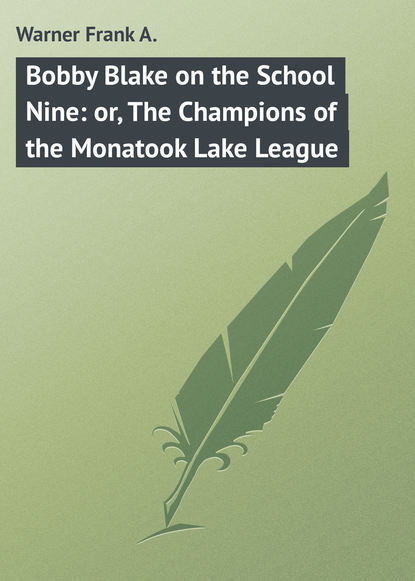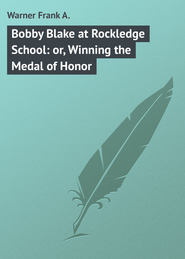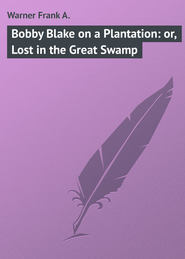По всем вопросам обращайтесь на: info@litportal.ru
(©) 2003-2024.
✖
Bobby Blake on the School Nine: or, The Champions of the Monatook Lake League
Настройки чтения
Размер шрифта
Высота строк
Поля
“You can’t miss that red mop of his,” put in Scat heartlessly.
“N-no,” said Betty, dropping her hand to her side. “I guess I don’t want to.”
Fred scented an easy victory, but made a mistake by not being satisfied to let well enough alone.
“She knows she can’t hit me and she’s afraid to try,” he gibed.
The light of battle began to glow in Betty’s eyes, but still she stood irresolute.
“I’ll give you a cent if you hit me,” pursued Fred.
“My! isn’t he reckless with his money?” mocked Pee Wee.
“He talks like a millionaire,” added Mouser.
“A whole cent,” mused Bobby.
Fred flushed.
“Make it a nickel, then,” he said. “And if that isn’t enough, I’ll give you a dime,” he added, in a final burst of generosity.
“Have you got it?” Betty asked suspiciously. She knew that Fred was usually in a state of bankruptcy.
“I’ve got it all right,” retorted her brother, “and what’s more I’m going to keep it, because you couldn’t hit anything in a thousand years.”
Whether it was the taunt or the dime or both, Betty was spurred to action. She hesitated no longer, but picked up a snowball and threw it at the fair mark that Fred presented.
It went wide and Fred laughed gleefully.
“Guess that dime stays right in my pocket,” he chuckled.
“Never mind, Betty,” encouraged Bobby. “You were just getting the range then. Better luck next time.”
But the next shot also failed, and Fred’s mirth became uproarious.
“I might just as well have made it a dollar,” he mocked.
But his smile suddenly faded when Betty’s third throw caught him right on the point of the nose.
Fortunately the ball was not very hard. It spread all over his face, getting into his eyes and filling his mouth, and leaving him for the moment blinded and sputtering.
The girls gave little shrieks and the boys doubled up with laughter, which increased as the victim brushed away the snow and they caught sight of his startled and sheepish face. Betty, in swift penitence, flew to his side.
“Oh, Fred!” she wailed, “I hope I didn’t hurt you!”
To do Fred justice, he was game, and after the first moment of discomfiture he tried to smile, though the attempt was not much of a success.
“That’s all right, Betty,” he said. “You’re a better shot than I thought you were. Here’s your dime,” he added, taking the coin from his pocket.
“I don’t want it,” replied Betty. “I’m sorry I won it.”
But Fred insisted and she took it, although reluctantly.
“Too bad you didn’t make it a dollar, Fred,” joked Pee Wee.
“Couldn’t hit you in a thousand years, eh?” chuckled Scat.
“Oh, cut it out, you fellows,” protested Fred. “I didn’t dodge anyway, did I? You’ve got to give me credit for that.”
“That was pretty good work for short distance shooting,” remarked Bobby Blake, molding a snowball. “But now watch me hit that rock on the other side of the road.”
“Look out that you don’t hit that horse,” cautioned Betty.
But the snowball had already left Bobby’s hand. He had thought that it would easily clear the scraggy old horse that was jogging along drawing a sleigh. But the aim was too low, and the snowball hit the horse plump in the neck.
The startled brute reared and plunged, and the driver, a big hulky boy with pale eyes and a pasty complexion, had all he could do to quiet him.
He succeeded at last, and then, grasping his whip, jumped over the side of the sleigh and came running up to the boys, his face convulsed with rage.
CHAPTER II
A FRIEND INTERFERES
“Oh,” gasped Betty, “it’s Ap Plunkit!”
“Yes,” added Fred, “and he’s as mad as a hornet.”
Applethwaite Plunkit was the son of a farmer who lived a short distance out of town. He was older and larger than the rest of the boys gathered on the station platform, and they all disliked him thoroughly because of his mean and ugly disposition.
Bobby and Fred had had several squabbles with him when he had attempted to bully them, but their quarrels had never yet got to the point of an actual fight. But just now, as he strode up to them, it looked as though a fight were coming.
Bobby was a plucky boy, and though he never went around looking for trouble, he was always willing and able to take his own part when it became necessary. But Ap was a great deal bigger and heavier than he, and just now had the advantage of the whip. So that Bobby’s breath came a little faster as Ap came nearer. But he never thought of retreating, and faced the bully with an outward calm that he was very far from feeling.
“Which one of you fellows hit my horse?” demanded Ap, in a voice that trembled with rage.
“I did,” replied Bobby, stepping forward a little in advance of the group.
“What did you do it for?” cried Ap, at the same time raising his whip.
“I didn’t aim at the horse,” replied Bobby. “I was trying to hit a rock on the other side of the road.”
“I don’t believe it,” snarled the bully.
“I can’t help whether you believe it or not,” answered Bobby. “It’s the truth.”
“You needn’t think you’re going to crawl out of it that way,” Ap snapped back. “You hit my horse on purpose and now I’m going to hit you.”
He lifted his whip higher to make good his threat. Bobby’s fists clenched and his eyes glowed.







